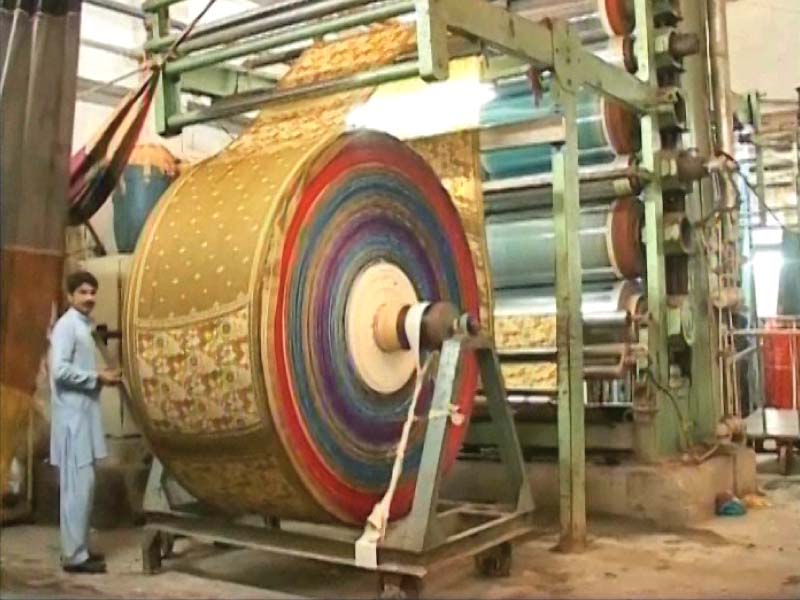
After the government imposed a 17% sales tax on the textile sector, the owners of the processing industry called for strikes in factories and refused to cooperate with other stakeholders within the textile industry.
The textile sector in Faisalabad works in a chain pattern, where each department depends on the other for the whole system to work smoothly; otherwise the entire process gets disrupted.
Currently, around 100 out of the total 150 units of the processing industry have been dysfunctional in the region since the last 12 days.
Meanwhile, this closure not only disrupted the chain of business of the processing industry, it also resulted in the closure of weaving and power looms industries. The power looms industry has become an age-old, high value industry due to its historical presence in the region. In the pre-modern era, most businesspersons started their careers in the textile industry with the installation of mostly man-handled machines known as power looms.
In the power looms industry, the sectors are unorganised and scattered in different areas of the city. Examples of these sectors include those in Ghulam Abad, Sidhu Pora, Jhan Road, Thikriwala and Bao Wala among others.
The labourers of these sectors work on daily wages and a closure results in redundancy, leaving a large number of workers without a job. So, with the closure of around 50,000 looms, thousands of labourers are now jobless. Similarly, the prolonged discontinuity in other sectors of processing, weaving and sizing has deprived many workers from earning a living wage.
According to the All-Pakistan Sizing Association, the textile sector works in different phases. The association is working to understand how the imposition of 17% sales tax will impact the textile sector and others.
In the first stages, spinning mills prepare yarn and then sell it in the yarn market, where millers pay a 17% sales tax on the invoice. Similarly, the sellers in the yarn market sell the yarn to power looms, which in turn sell it to brokers and local dealers of clothing businesses after producing fabric power looms. The brokers and dealers then hand over the grey cloths to processing and dying mills owners for printing. The product finally goes to wholesalers and retailers. The tax will be charged at each of these stages of the trade.
Faisalabad Chamber of Commerce and Industry (FCCI) president said that the organisation is ready to contribute to taxes. “This double digit figure will create hurdles in refund claims. A lot of money will be added at the government end, creating constraints in new investment.”
He added that FCCI Officials put forward their demands during negotiations with the Federal Board of Revenue (FBR) Chairperson Shabbar Zaidi and suggested minimising the tax ratio of 17% to a single digit. “We also emphasized bringing the unorganised sector into the tax network.”
The FBR chairperson visited FCCI a few days ago and refused to bring down the 17% sales tax to a single digit. “The economic team of the prime minister is working on different sectors. The team’s focus is to stop the misuse of the Afghan trade corridor, overcome issues of under-invoicing and the smuggling of drugs,” the chairperson said at the time.
During the negotiation round, the FBR chairperson heard suggestions from different officer bearers of the textile industry’s organisations and formed a committee for further negotiation. A meeting of this committee will be held in Islamabad over the next couple of days.
The FBR chairperson showed some flexibility on the compulsory condition of Computerised National Identity Cards (CNIC) during trade and transactions of any business. He commented that the inflation is due to a spike in price of the US dollar.
All-Pakistan Processing Mills Association former regional chairperson and FCCI Vice President Ahtsham Javed said that their association is not on a strike. “We are interested in helping the government in their tax collection move.”
He added that the processing industry is currently facing a shortage of raw material from local businesspersons. “The dealers avoid placing orders for printing, due to which factories remain closed. He further said that he is determined to register businesspersons who were previously operating as unregistered producers.
Meanwhile, jobless workers began efforts for the restoration of work in factories. Under the leadership of Labor Leader Latif Ansari, the workers held a protest camp at Clock Tower Chowk and chanted slogans. ”The tax issue is not relevant to workers,” Ansari said. “The owners should pay their taxes and resolve the matter. The workers need their jobs and basic working conditions. What is their fault if the government imposes taxes on factory owners?” He demanded that owners reopen their factories, warning that workers would have to block the roads if they failed to do so.”
A worker named Azam Jutt told The Express Tribune that most workers are already bearing heavy household expenses. “Workers are under severe financial pressure of heavy utility bills, inflation on edibles and daily consumption items. The government should do more for the betterment of factory workers.”
On the contrary, traders of eight bazaars gathered at Clock Tower Chowk and announced shutter down strikes against the imposition of the sales tax and the condition of mandatory CNICs for business. Traders Association Chairperson Aslam Bhali said that small shopkeepers cannot afford to pay the imposed tax. “Small shopkeepers cannot deal with such financial hurdles given the struggles they already face in finding good customers. The CNIC compulsion will be enforced by category, keeping in view the quantum and size of a shop.”
Secretary General Mahmood Alam Jutt said that all business points will be closed for strikes which will take place throughout the city.
Published in The Express Tribune, July 13th, 2019.
1732090022-0/Elmo-and-Amelia-(1)1732090022-0-405x300.webp)
1725523665-0/Minecraft-Movie-(1)1725523665-0-165x106.webp)

1732089759-0/BeFunky-collage-(75)1732089759-0-165x106.webp)

1732090878-3/Untitled-design-(22)1732090878-3-270x192.webp)

1724268870-0/Supreme-Court-of-Pakistan-(2)1724268870-0-270x192.webp)









COMMENTS
Comments are moderated and generally will be posted if they are on-topic and not abusive.
For more information, please see our Comments FAQ